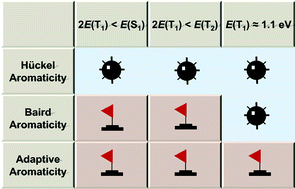Computational predictions of adaptive aromaticity for the design of singlet fission materials†
Abstract
Singlet fission has attracted extensive attention from experimentalists and theoreticians due to its ability to improve the photovoltaic conversion efficiency. Still, designing singlet fission materials remains challenging. In this work, we explored the relationship between adaptive aromaticity and singlet fission potentials by computationally screening the adaptive aromatic species reported by our group. Adaptive aromaticity refers to species with aromaticity in the lowest singlet and the lowest triplet states, and density functional theory calculations reveal that species with adaptive aromaticity usually generate an intermediate E(T1)a value (singlet–triplet gaps). In most cases, species with adaptive aromaticity satisfy the thermodynamic requirements of the singlet fission process (2E(T1) < E(S1) and 2E(T1) < E(T2)). Thus, our findings demonstrate that adaptive aromaticity could provide an alternative strategy for experimentalists and theoreticians to design singlet fission materials.



 Please wait while we load your content...
Please wait while we load your content...